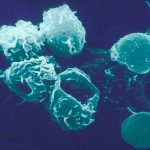Lien vers Pubmed [PMID] – 11722620
Immunol. Rev. 2001 Aug;182:5-17
Lymphocytes can interfere with the activity of other lymphocytes in a thousand and one ways. A particular subset of so-called regulatory CD4+ T cells is capable of controlling the activity of other lymphocytes in yet another way. Their function is primarily defined by the ability to protect the integrity of tissues and organs in vivo. This was demonstrated in experimental models of natural tolerance to peripheral tissues, transplantation tolerance and the regulation of immune responses promoted by exogenous antigens at the level of the intestinal mucosa. Moreover, regulatory T cells also play a major role in the systemic homeostatic mechanisms that control total lymphocyte numbers. There is good evidence to support the contention that a significant fraction of the naturally occurring regulatory T cells is generated in the thymus following selection mediated by high avidity T-cell receptor/ligand interactions. Symbolically, self-reactive regulatory T cells do represent the breakthrough of concepts challenging the long-lasting Burnetian dogma that all autoreactive cells should be eliminated or inactivated. Although clonal deletion of self-reactive cells is a fundamental process in T-cell development, controlled autoreactivity is part of the physiology of the immune system. Thus, autoreactive regulatory T cells also protect immunologists from the desperate hunting for the evil of horror autotoxicus.


